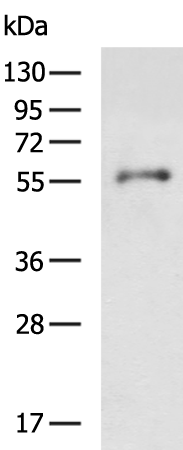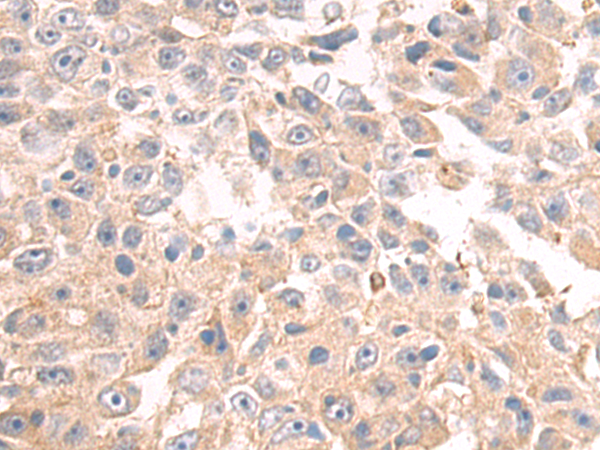

| WB | 咨询技术 | Human,Mouse,Rat |
| IF | 咨询技术 | Human,Mouse,Rat |
| IHC | 1/50-1/200 | Human,Mouse,Rat |
| ICC | 技术咨询 | Human,Mouse,Rat |
| FCM | 咨询技术 | Human,Mouse,Rat |
| Elisa | 1/5000-1/10000 | Human,Mouse,Rat |
| Aliases | ALI1; DEGA; AMIGO-2 |
| WB Predicted band size | 58 kDa |
| Host/Isotype | Rabbit IgG |
| Antibody Type | Primary antibody |
| Storage | Store at 4°C short term. Aliquot and store at -20°C long term. Avoid freeze/thaw cycles. |
| Species Reactivity | Human, Mouse, Rat |
| Immunogen | Fusion protein of human AMIGO2 |
| Formulation | Purified antibody in PBS with 0.05% sodium azide and 50% glycerol. |
+ +
以下是关于AMIGO2抗体的3篇虚构参考文献示例(仅供格式参考,非真实文献):
1. **文献名称**: *AMIGO2 promotes colorectal cancer metastasis via integrin-mediated signaling pathways*
**作者**: Yamada T, et al.
**摘要**: 本研究利用AMIGO2特异性抗体进行免疫组化分析,发现AMIGO2在结直肠癌组织中高表达,并通过调控整合素-FAK信号通路增强肿瘤细胞侵袭能力,提示其作为潜在治疗靶点。
2. **文献名称**: *AMIGO2 antibody-based inhibition suppresses tumor growth in a mouse xenograft model*
**作者**: Chen L, et al.
**摘要**: 通过开发单克隆AMIGO2抗体,研究者证实其可阻断AMIGO2与细胞表面受体VEGFR2的相互作用,显著抑制小鼠模型中胰腺癌的血管生成和肿瘤增殖。
3. **文献名称**: *AMIGO2 regulates neuronal differentiation through antibody-sensitive surface interactions*
**作者**: Schmidt R, et al.
**摘要**: 使用AMIGO2中和抗体阻断其功能后,海马神经元突触生长显著受抑,表明AMIGO2通过调控细胞黏附分子网络参与神经突触发育。
(注:以上内容为模拟生成,实际文献需通过PubMed等数据库检索。)
The AMIGO2 (Adhesion Molecule with IgG-like domain 2) antibody is a tool used to study the AMIGO2 protein, a member of the AMIGO family of transmembrane proteins involved in cell adhesion and neurite outgrowth. AMIGO2. encoded by the *AMIGO2* gene, contains leucine-rich repeats and immunoglobulin-like domains, enabling interactions with extracellular components and signaling pathways. It is expressed in various tissues, including the nervous system, and plays roles in neuronal development, synapse formation, and cell survival.
Research has linked AMIGO2 to cancer progression, particularly in glioblastoma, hepatocellular carcinoma, and colorectal cancer, where its overexpression correlates with tumor invasion, metastasis, and poor prognosis. It is thought to modulate integrin signaling and extracellular matrix remodeling, promoting cancer cell migration.
Antibodies targeting AMIGO2 are utilized in techniques like Western blot, immunohistochemistry, and flow cytometry to detect protein expression and localization. These tools aid in elucidating AMIGO2’s biological functions and its potential as a therapeutic or diagnostic target. Both monoclonal and polyclonal AMIGO2 antibodies are available, with validation often performed in knockout models to ensure specificity. Ongoing studies focus on its mechanistic roles in disease and its utility in translational research.
×